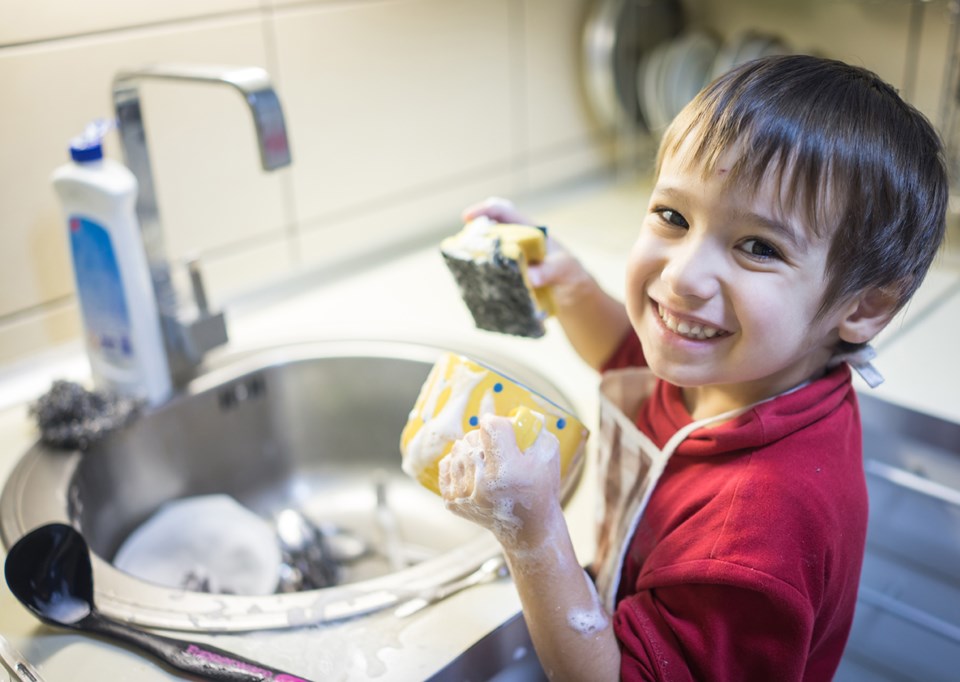The ability of two children to transform a once-tidy room into a chaotic space of clutter in under five minutes is astounding. And the rinse and repeat routine of constantly clearing up after them can be draining.
Perhaps it’s time they pitched in.
But how do you encourage young children to do chores? And should you even ask for their help or should they just be indulging in childhood play?
“Engaging children in work around the household is really important,” said Christine Martin, principal at Squamish Waldorf School.
“Work is play for them and it helps develop a healthy attitude that contributing to the household is just normal.”
Children also want to help, Martin added. “They want to please and they want to figure out the world, so by helping with household chores we are helping them subconsciously understand the world they live in.”
The younger we start, it seems, the better.
“We establish habits in the first seven years... that is the foundation. If we get them involved early, whether it’s setting the table, making their bed, or helping to cook, it just becomes part of how life flows and it lives with them going forward,” Martin said.
Though saving chores until nap time may seem like a more efficient way of getting things done, it’s not necessary, explained Martin.
“If children see parents sweeping or wiping a counter top they want to help, because they’re learning through imitation and want to do what the parent is doing. If they don’t see these tasks it can be really hard for them in later life.”
Doing them together is also an opportunity to be present, she added. To connect and have fun, and to share the experience of meaningful work.
“When doing chores with little ones, know that your objective is not to get it done quickly but to make it a more enjoyable, and less painful experience.”
Though it is important to finish the task, she added, so that the child can experience the completion, and not leave things half done.
For example, playing eye-spy as you hunt for things to pick up from the floor.
“When my children were little, they loved it when I threw all the laundry on the floor and they’d jump in the middle and pretend they were laundry to be folded. I’d fold up their arms and legs, then they’d jump up and run away as fast as they could, so I’d chase them and if I caught them I’d fold them up again. They loved this game! It wasn’t about how fast we could get the laundry folded – it probably took about ten times as long – but it was about how we could make it fun.”
Children also love to be close to parents, explained Martin, so when you’re cooking give them a pot and some flour to mix up so that they can be in the kitchen with you.
“It’s about finding age appropriate activities,” she said.
And you may not always get compliance, but that’s quite natural for a child.
“Don’t argue about it or give them a lecture. Mostly it’s about saying, ‘I know, I don’t really want to put my pyjamas away either, but we’re going to do it.’”
To make sure it gets done, you may need to take their hand and walk them back into the room to move through the task together until it is complete, she explained.
“It’s togetherness, it’s not threatening. You’re standing your ground. There’s an importance in being grounded and absolute and loving and present, but not wavering which causes confusion for the child and reinforces for them to be little debaters.”
When they do help, try not to overdo the praise, Martin said.
“Just saying, ‘Johnny, I see you put away your pyjamas,’ is enough praise. You’ve noticed; you’re confirming what they’ve done. You don’t need, ‘Wow you’re so helpful!’ as it loses value.
Finally, you may find that putting together a collection of simple tools for your child really encourages their involvement, Martin suggested.
For example, a small broom, cloths of their own, a spray bottle, and some gardening tools. Though try and avoid using harsh chemicals with little ones.



